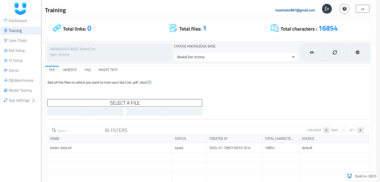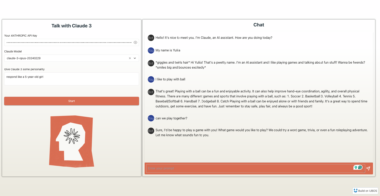UBOS Asset Marketplace: browser-use MCP Server - Unleash AI-Powered Browser Automation
In today’s rapidly evolving digital landscape, businesses are constantly seeking innovative solutions to streamline their operations, enhance productivity, and gain a competitive edge. The integration of Artificial Intelligence (AI) into various aspects of business processes has emerged as a game-changer, offering unprecedented opportunities for automation, optimization, and decision-making. At UBOS, we are committed to empowering businesses with cutting-edge AI solutions that drive tangible results. That’s why we are thrilled to introduce the browser-use MCP (Model Context Protocol) Server – a revolutionary tool that combines the power of AI with the versatility of browser automation.
What is the browser-use MCP Server?
The browser-use MCP Server is an AI-driven browser automation server that implements the Model Context Protocol (MCP). MCP is an open protocol standardizing how applications provide context to Large Language Models (LLMs). It allows AI models to access and interact with external data sources and tools. It enables seamless communication between AI agents and web browsers, allowing for natural language control and intelligent web research. Built upon the foundation of the browser-use/web-ui project, this MCP server adapts core browser automation logic and configuration patterns to provide a robust and flexible solution for a wide range of applications.

The browser-use MCP Server acts as a bridge, allowing AI models to access and interact with web browsers using natural language commands. This opens up a world of possibilities for automating tasks, extracting data, and conducting research on the web.
Key Features of the browser-use MCP Server
The browser-use MCP Server boasts a comprehensive set of features designed to meet the diverse needs of businesses seeking to leverage AI-powered browser automation:
- MCP Integration: The server fully implements the Model Context Protocol (MCP), ensuring seamless communication with AI agents and LLMs.
- Browser Automation: Control web browsers using natural language commands via the
run_browser_agenttool. This includes page navigation, form filling, and element interaction. - Visual Understanding: Optionally enable screenshot analysis for vision-capable LLMs, allowing the AI to “see” and understand web page content.
- State Persistence: Manage browser sessions across multiple MCP calls or connect to a user’s existing browser session for persistent automation.
- Multi-LLM Support: Integrate with a wide range of LLM providers, including OpenAI, Anthropic, Azure, DeepSeek, Google, Mistral, Ollama, OpenRouter, Alibaba, Moonshot, and Unbound AI.
- Deep Research Tool: Utilize the dedicated
run_deep_searchtool for multi-step web research and report generation, automating complex information gathering tasks. - Environment Variable Configuration: Fully configure the server using environment variables, allowing for easy customization and deployment.
- CDP Connection: Connect to and control a user-launched Chrome/Chromium instance via the Chrome DevTools Protocol, enabling automation within existing browser environments.
Use Cases for the browser-use MCP Server
The browser-use MCP Server can be applied to a wide array of use cases across various industries:
- Automated Web Research: Conduct in-depth research on specific topics, gather data from multiple sources, and generate comprehensive reports – all without manual intervention.
- Data Extraction and Scraping: Automatically extract structured data from websites, such as product information, pricing, and contact details.
- Form Filling and Submission: Automate the process of filling out and submitting online forms, saving time and reducing errors.
- Social Media Management: Automate tasks such as posting updates, monitoring mentions, and engaging with followers.
- E-commerce Automation: Automate tasks such as product listing, order processing, and customer support.
- Lead Generation: Automatically identify and gather information on potential leads from various online sources.
- Content Creation: Automate the process of generating website content, blog posts, and marketing materials.
- Testing and Quality Assurance: Automate the testing of web applications and websites, ensuring functionality and performance.
Examples of AI-Driven Browser Automation with browser-use MCP Server
To further illustrate the capabilities of the browser-use MCP Server, let’s explore some specific examples of how it can be used in different scenarios:
- Market Research: A marketing team can use the
run_deep_searchtool to conduct market research on a specific product or industry. The server can automatically gather data from various sources, such as news articles, blog posts, and social media feeds, and generate a report summarizing the key trends and insights. They can define theresearch_taskto be something like, “Analyze the current trends in the electric vehicle market” and set themax_search_iterationsandmax_query_per_iterationparameters to control the depth of the search. - Competitor Analysis: A business can use the
run_browser_agenttool to monitor its competitors’ websites and track changes in their pricing, product offerings, and marketing strategies. The AI agent can be instructed to navigate to specific competitor websites, extract relevant data, and generate a report highlighting any significant changes. - Customer Support Automation: A customer support team can use the
run_browser_agenttool to automate responses to common customer inquiries. The AI agent can be trained to understand natural language questions and provide relevant answers by accessing information from the company’s website or knowledge base. Example task could be, “Find the return policy for order #12345 on example.com” withadd_infosproviding the specific website credentials if needed. - Content Aggregation: A news organization can use the
run_deep_searchtool to automatically aggregate news articles from various sources and create a daily news digest. The server can be configured to search for articles on specific topics and generate a summary of the most important stories. SettingMCP_RESEARCH_MAX_ITERATIONSandMCP_RESEARCH_MAX_QUERYallows for a controlled and focused search. - SEO Optimization: An SEO specialist can use the
run_browser_agenttool to analyze the search engine rankings of their website and identify areas for improvement. The AI agent can be instructed to perform keyword research, analyze competitor websites, and generate a report with recommendations for optimizing the website’s content and structure.
How to Integrate the browser-use MCP Server with UBOS
The browser-use MCP Server seamlessly integrates with the UBOS platform, allowing you to leverage its powerful AI capabilities within your existing UBOS workflows. Here’s how you can integrate the server with UBOS:
- Deploy the browser-use MCP Server: Deploy the server on your infrastructure or use a cloud-based deployment service. Follow the instructions in the Quick Start section to set up the server and configure the necessary environment variables.
- Configure UBOS to connect to the MCP Server: Within the UBOS platform, configure a connection to the deployed browser-use MCP Server. This involves specifying the server’s address, port, and any required authentication credentials.
- Create AI Agents in UBOS: Use the UBOS AI Agent development platform to create custom AI Agents that utilize the browser-use MCP Server to interact with web browsers. Define the tasks and objectives for your agents, and specify the natural language commands that they should use to control the browser.
- Orchestrate AI Agents with UBOS Workflows: Integrate your AI Agents into UBOS workflows to automate complex business processes. Use the UBOS orchestration tools to define the sequence of steps that your agents should follow, and specify the conditions under which they should be triggered.
- Monitor and Manage AI Agents with UBOS: Use the UBOS monitoring and management tools to track the performance of your AI Agents and identify any issues that may arise. The UBOS platform provides detailed logs and metrics that can help you optimize your agents and ensure that they are running smoothly.
Benefits of Using the browser-use MCP Server with UBOS
By integrating the browser-use MCP Server with the UBOS platform, you can unlock a wide range of benefits for your business:
- Increased Automation: Automate repetitive tasks and processes, freeing up your employees to focus on more strategic and creative work.
- Improved Efficiency: Streamline your workflows and reduce the time it takes to complete tasks, leading to significant cost savings.
- Enhanced Accuracy: Minimize human error and ensure that tasks are completed consistently and accurately.
- Data-Driven Decision Making: Gather and analyze data from various online sources to make informed business decisions.
- Competitive Advantage: Gain a competitive edge by leveraging the power of AI to automate tasks and optimize your business processes.
Configuration Details and Considerations
Proper configuration of the browser-use MCP Server is crucial for optimal performance and security. Here are some key configuration details and considerations:
- LLM Provider Selection: Choose the LLM provider that best suits your needs and budget. Consider factors such as model performance, cost, and availability.
- API Key Management: Securely manage your API keys for the chosen LLM provider. Avoid hardcoding API keys in your code and use environment variables instead.
- Browser Settings: Configure the browser settings to optimize performance and security. Consider disabling features such as JavaScript and plugins if they are not required for your automation tasks.
- CDP Connection Security: If connecting to your own browser via CDP, ensure that the connection is secure and that only authorized users have access to the browser.
- Logging and Monitoring: Configure logging and monitoring to track the performance of the server and identify any issues that may arise.
Get Started with the browser-use MCP Server Today
The browser-use MCP Server is a powerful tool that can transform the way you automate browser tasks and leverage AI in your business. By integrating it with the UBOS platform, you can unlock a world of possibilities for automation, optimization, and innovation.
Ready to take your business to the next level with AI-powered browser automation? Contact us today to learn more about the browser-use MCP Server and the UBOS platform. Our team of experts will work with you to develop a customized solution that meets your specific needs and helps you achieve your business goals.
Conclusion
The browser-use MCP Server represents a significant advancement in the field of AI-powered browser automation. By combining the power of AI with the versatility of web browsers, this innovative tool empowers businesses to automate tasks, extract data, and conduct research in a more efficient and effective manner. When integrated with the UBOS platform, the browser-use MCP Server becomes an even more powerful asset, enabling businesses to orchestrate AI Agents, connect them with enterprise data, and build custom AI Agents with their own LLM models and Multi-Agent Systems. As AI continues to evolve and transform the business landscape, the browser-use MCP Server is poised to play a crucial role in helping businesses unlock the full potential of this transformative technology.
Browser Use MCP Server
Project Details
- wenpingwu001/mcp-browser-use
- MIT License
- Last Updated: 4/9/2025
Categories
Recomended MCP Servers
A Model Context Protocol (MCP) server for interacting with Home Assistant. This server provides tools to control and...

MCP Server for Adobe After Effects. Enables remote control (compositions, text, shapes, solids, properties) via the Model Context...
MCP web research server (give Claude real-time info from the web)


Scrapeless Mcp Server
Model Context Protocol server for Flight Tracking
A MCP server that enables Claude to discover and call any API endpoint through semantic search. Intelligently chunks...
The core MCP extension for Systemprompt MCP multimodal client

kali linux mcp,pentest,penetration test


Now you can date a Zoom meeting with AI's help.
A Model Context Protocol (MCP) for Jupyter Notebook
 From vibe coding to vibe deployment. UBOS MCP turns ideas into infra with one message.
From vibe coding to vibe deployment. UBOS MCP turns ideas into infra with one message.





